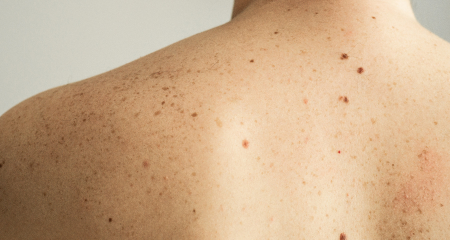
Skin cancer is the most common type of cancer in the United States, with one in three Texans being affected. At Northstar Dermatology, our board-certified dermatologists specialize in comprehensive full-body screenings to detect issues early, along with expert surgical treatment for all types of skin cancer. Our team emphasizes the importance of prevention and early detection, educating patients on effective ways to lower skin cancer risks.
While melanoma is well-known, it is actually one of the rarest forms of skin cancer. Basal cell carcinoma and squamous cell carcinoma impact far more patients than melanoma.
The most common type of skin cancer is Basal cell carcinoma. While it is not typically life-threatening, the lesion will continue to grow and may invade surrounding tissues if left untreated. Basal cell carcinoma is primarily caused by extended UV exposure, either from the sun or indoor tanning.
Those with fair skin, a history of sunburns, red hair, or freckles may have a higher risk of developing basal cell carcinoma. Individuals who work outdoors or live in sunny climates year-round are also more vulnerable to skin cancer. If you notice a non-healing spot or a persistent scaly patch, it may be a sign of basal cell carcinoma. Contact a board-certified dermatologist for a thorough evaluation.
Squamous cell carcinoma is the second most prevalent form of skin cancer. Like basal cell carcinoma, it is caused by exposure to UV light, whether from the sun or indoor tanning. However, unlike basal cell carcinoma, squamous cell carcinoma has the potential to metastasize to other areas of the body, which can be life-threatening.
Fortunately, it tends to grow slowly, but early treatment is crucial to prevent spreading. Squamous cell carcinoma may appear as a non-healing spot, a persistent scaly patch, or a wart-like growth. If you observe any of these signs or notice any new or changing spots, it’s vital to seek out an evaluation as soon as possible.
The doctors at Northstar Dermatology specialize in the surgical treatment of all types of skin cancer. The primary approach to treatment is surgical excision, where a dermatologist cuts outs the cancerous tissue along with a margin of surrounding healthy tissue to ensure complete removal. The area is then sutured closed, and recovery time will be needed afterward. This includes limitations on lifting and physical activity for a couple of weeks.
For more superficial or early-stage skin cancers, non-surgical options may include a procedure known as electrodesiccation and curettage, or chemotherapy injections. In cases involving larger skin cancers or those located in cosmetically sensitive spots, your dermatologist may refer you to a Mohs surgeon for excision.
A Skin Cancer Screening is a full-scale, top-to-bottom examination aimed at identifying any suspicious growths or potential skin cancers. After you change into a gown, our specialist will conduct a detailed assessment of your skin to locate all “spots” present. Some lesions may be evaluated using a dermatoscope, which is a specialized magnifying light that allows for a closer look at the skin’s unique characteristics.
If any lesions present symptoms of skin cancer or other abnormalities, your doctor may suggest a skin biopsy to verify the diagnosis. Biopsies are quick procedures in which a sample of the lesion is taken and sent to a lab for analysis. During skin cancer screenings, pre-cancerous spots (actinic keratoses) and other benign lesions may also be treated.
Skin Cancer screenings focus primarily on identifying potential skin cancers and informing patients about the various lesions observed during the examination. Unrelated issues like acne or rashes will generally require a separate consultation.
Skin cancer screenings are recommended for everyone, regardless of skin type. However, some individuals possess certain characteristics or factors that put them at greater risk:
If any of these apply to you, scheduling regular skin cancer screenings can be crucial.
